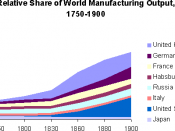The rapid industrialization of the European nations during the 18th and 19th century caused poverty to many workers. It caused so much poverty that some people have been led to ask if such momentum was necessary. Although the destitution was unfortunate, it was a necessary side effect of something that would forever benefit the people of the modern world.
The industrial revolution brought a lot of good towards the quality of life of the people. For example, from 1850 to 1870, the city of Paris was almost completely rebuilt. New streets, betters houses, a police force, lighting, and a sanitation system were put into place. If the industrial revolution was still taking place, the people of Paris would still be waiting for those very basic things. Also, many of the human decency laws were first created during the industrial revolution. The Factory Act of 1833, limited work day for children.
The Mines Act of 1842, banned women from mines, and made 13 the minimum age for boys. The Ten Hour Act 1845, limited the work day for women and children under 18 years of age to 10 hours. In 1874, it was extended to all workers. If the industrial revolution was not as rapid, these laws would not have been put into place as fast, thus dragging out the horrible conditions.
Some people believe that the hardships of the industrial revolution were so horrendous, that even people living hungry in a farm-based life would be better off than working in a factory. This may be true, to some extent, because of the dangers involved in city work such as numerous factory accidents, pollution, and diseases caused by such dense population. The people that believe this point of view that it was not worth it are not looking at...


